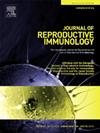妊娠后期母猪补充中药配方可增强其子代回肠屏障和抗炎能力。
IF 2.9
3区 医学
Q3 IMMUNOLOGY
引用次数: 0
摘要
背景:妊娠后期的营养状况对仔猪成活率、出生体重、生长性能和免疫功能有显著影响,同时在调节肠道屏障功能方面也起着关键作用。然而,补充中药是否能增强子代仔猪肠道屏障功能和免疫功能尚不清楚。方法:选取孕85 d的晚期妊娠母猪24头,随机分为CON组和中药组,进行为期30 d的饲养试验。分娩后,每组随机选取10头新生仔猪进行安乐死,收集回肠组织和盲肠内容物进行分析。采用网络药理学方法对中药复方的主要有效成分和靶点进行了分析。结果:中药组大鼠回肠绒毛伸长加深,Peyer’s斑块明显增多,肠道免疫功能明显增强,抗炎能力明显增强。此外,母体中添加中药可能会增加仔猪盲肠中Sutterella和放线素平面的丰度,从而显著影响化学异养、有氧化学异养和发酵功能。PI3KCA和PI3KCB可能是14种中草药的中枢基因。山奈酚、槲皮素和木犀草素是通过调节MAPK信号通路、钙信号通路和cAMP信号通路对新生仔猪产生潜在积极影响的前三种活性成分。结论:母猪饲粮中添加中草药可显著提高仔猪回肠屏障功能和抗炎能力,这可能与有效成分、调节肠道微生物群落和激活多种信号通路有关。本文章由计算机程序翻译,如有差异,请以英文原文为准。
Traditional Chinese medicines formula supplementation to late pregnancy sows enhance the ileal barrier and anti-inflammatory capacity of their offspring
Background
The nutritional status during the late stage of pregnancy significantly influences the survival rate, birth weight, growth performance, and immune function of piglets while also playing a pivotal role in regulating intestinal barrier function. However, it remains unclear whether supplementation with traditional Chinese medicine (TCM) can enhance offspring piglets' intestinal barrier function and immune function.
Methods
24 late-pregnancy sows (85 days pregnant) were randomly assigned to either CON group or TCM group for a 30-day feeding trial. Following parturition, 10 newborn piglets from each group were randomly selected for euthanasia, and the ileal tissues as well as cecal contents were collected for analysis. The hub active ingredients and targets of TCMs formula were analyzed using network pharmacology.
Results
TCM group exhibited elongation and deepening of villi in the ileum, a significant increase in Peyer's patches, notable enhancement of intestinal immune function, and improved anti-inflammatory ability. Further, maternal TCMs supplementation might increase the abundances of Sutterella and Actinoplanes in the piglet cecum, which significantly affected chemoheterotrophy, aerobic-chemoheterotrophy, and fermentation functions. PI3KCA and PI3KCB may serve as hub genes for the 14 TCMs. Kaempferol, Quercetin, and Luteolin were identified as the top three active ingredients with potential positive effects on Neonatal piglets through modulation of MAPK signaling pathway, calcium signaling pathway, and cAMP signaling pathway.
Conclusion
Incorporating Chinese herbs into the diets of sows significantly improves the Ileum barrier function and anti-inflammatory capacity of piglets, potentially attributable to active ingredients, modulation of intestinal microbial communities, and activation of diverse signaling pathways.
求助全文
通过发布文献求助,成功后即可免费获取论文全文。
去求助
来源期刊
CiteScore
6.30
自引率
5.90%
发文量
162
审稿时长
10.6 weeks
期刊介绍:
Affiliated with the European Society of Reproductive Immunology and with the International Society for Immunology of Reproduction
The aim of the Journal of Reproductive Immunology is to provide the critical forum for the dissemination of results from high quality research in all aspects of experimental, animal and clinical reproductive immunobiology.
This encompasses normal and pathological processes of:
* Male and Female Reproductive Tracts
* Gametogenesis and Embryogenesis
* Implantation and Placental Development
* Gestation and Parturition
* Mammary Gland and Lactation.

 求助内容:
求助内容: 应助结果提醒方式:
应助结果提醒方式:


